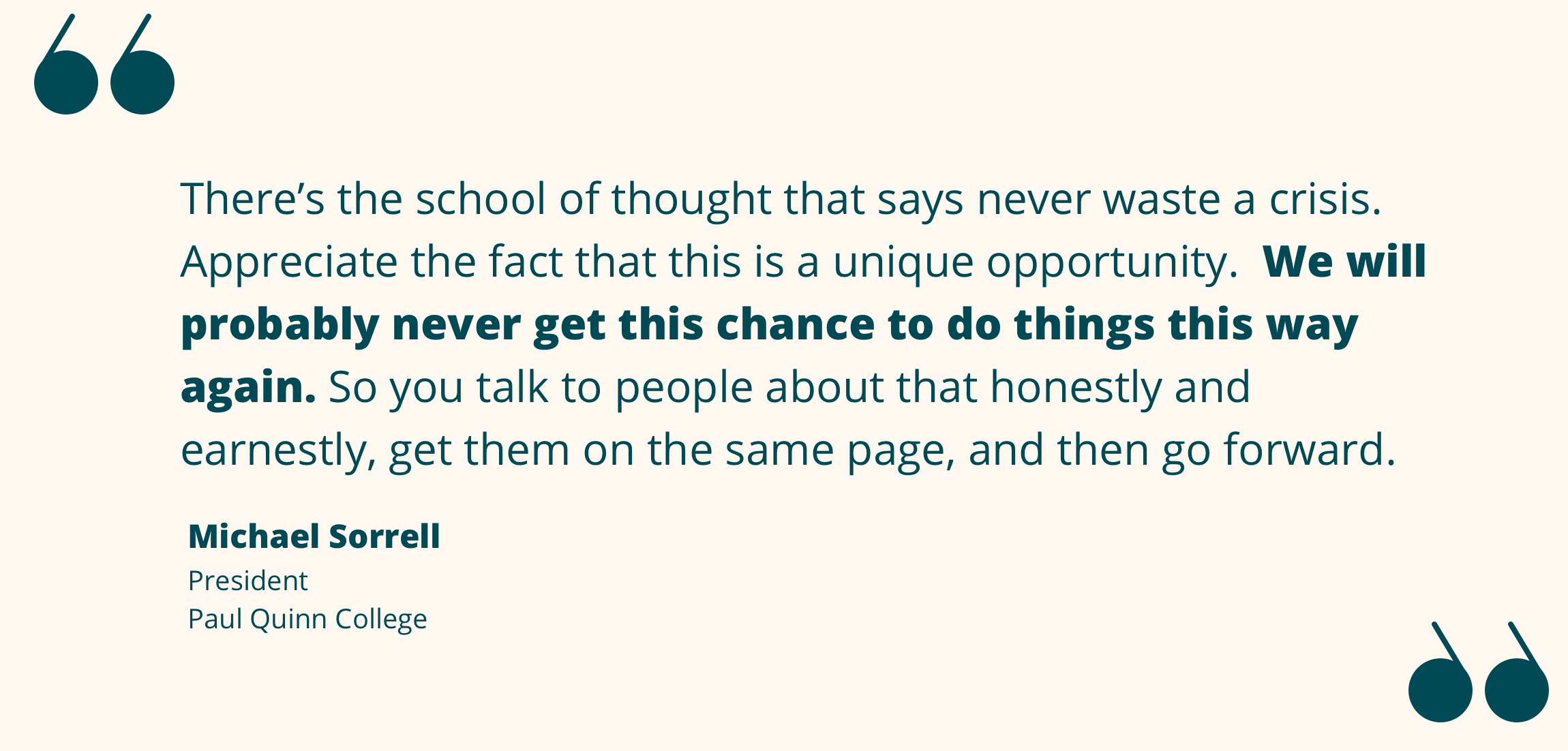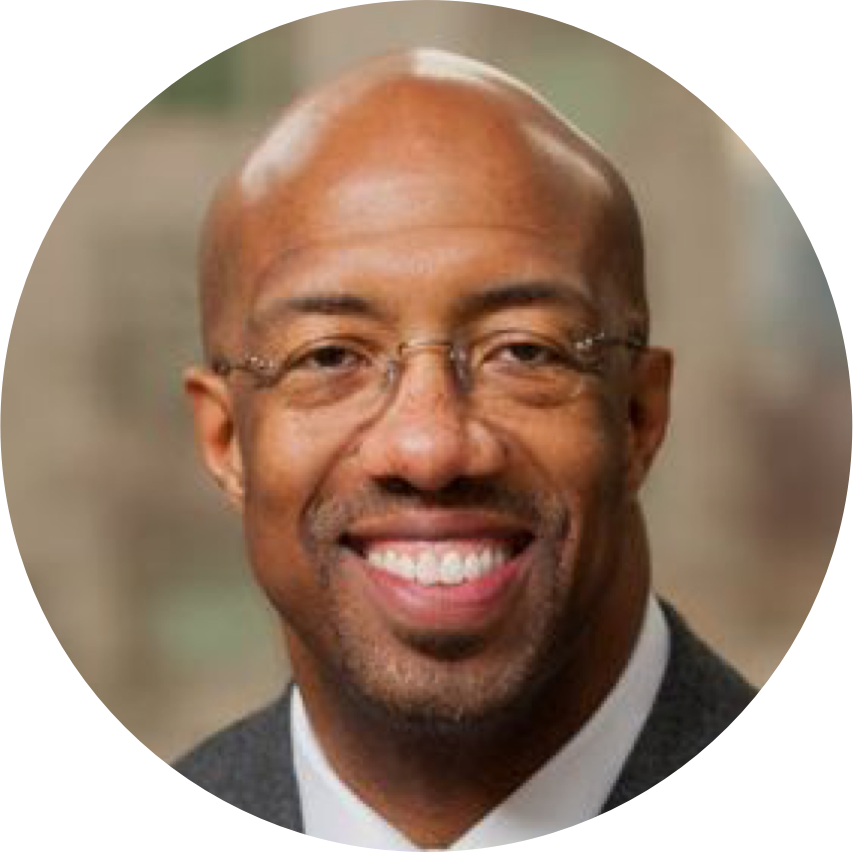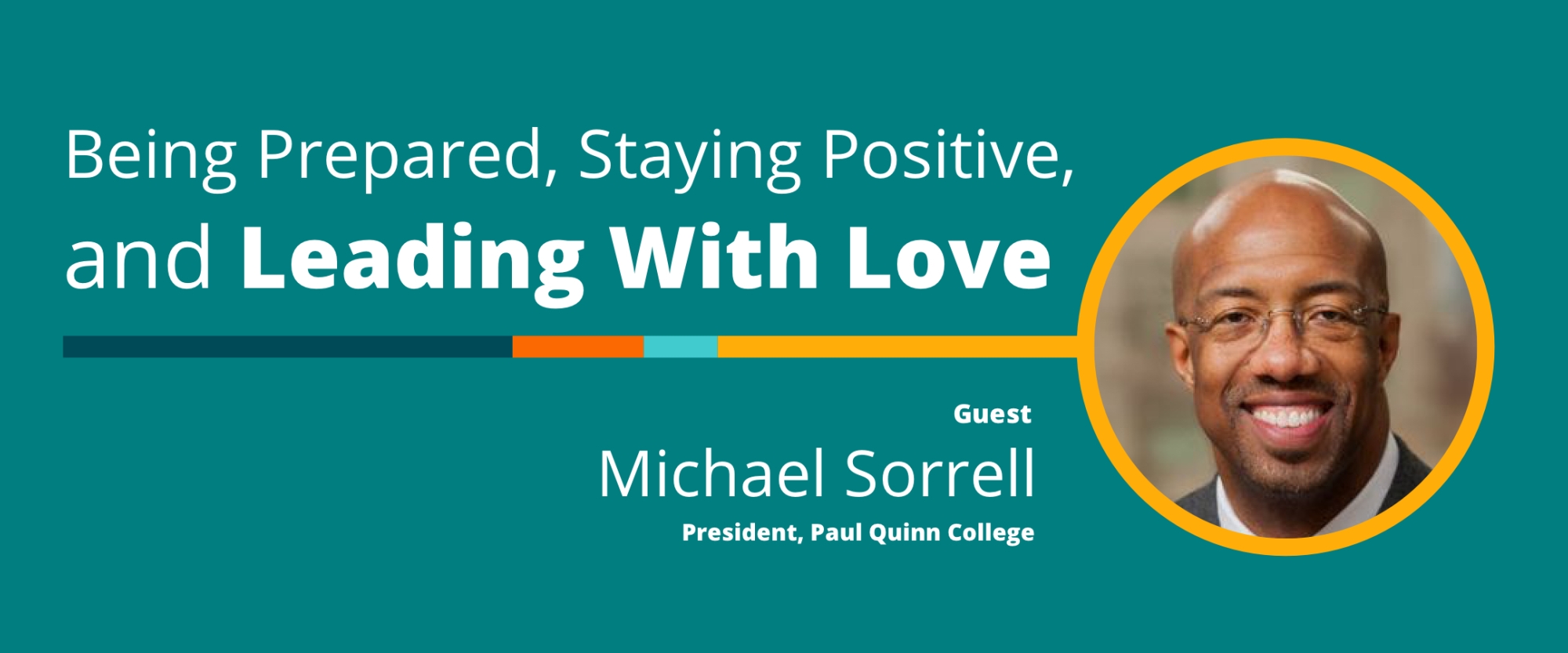Note: This interview originally aired on April 20, 2020 as part of the University Innovation Alliance’s Weekly Wisdom Series that airs live on Facebook, Twitter, and LinkedIn.
As Executive Director of University Innovation Alliance (UIA), I'm happy to be part of the Weekly Wisdom podcast series with my co-host Jeff Selingo, author, journalist, and special advisor at Arizona State University. Our second Weekly Wisdom conversation, created in partnership with Inside Higher Ed, brought us an inspiring exchange with Dr. Michael Sorrell, President of Paul Quinn College in Dallas, Texas. President Sorrell's perspective is unique: he's a man of faith and vision with a pragmatic background in crisis management. All of these skills are essential for a school leader managing a historically Black college in this challenging year of the COVID-19 pandemic. We knew we'd hear great things from somebody listed as one of the 10 most innovative college presidents in the country (Washington Monthly Magazine) and one of the world's top 50 leaders (Fortune Magazine), and we certainly appreciated the wisdom he shared with us.
Being Prepared, Staying Positive, and Leading With Love
As a college administrator during the COVID pandemic, President Sorrell brings the benefits of a previous career in crisis management. He explained to us how he'd started anticipating the disruption by late January, and had already gotten clearance from the Paul Quinn College board to send his students home before high-profile institutions like Harvard (even though Harvard announced first). "And so," he added, "we had the advantage of not having to be so reactive that we could do a little bit of forward thinking." He admitted that, while missing his staff and students and being sensitive to what we're going through as a society, "what’s keeping me positive is that I would not get to spend the amount of time that I have with my kids and wife."
President Sorrell leads Paul Quinn College with what he called a very simple and fundamental principle: "You should never lead people you do not and cannot love." His priority is the wellbeing of his students and staff. As he described his staff meetings, "We’ve created a safe space where people can talk about, 'I am struggling, I am sad, I am scared.' And I want people to know that I will hear them." He understands that, quite simply, people will work better when they feel better.
Minimizing Regret and Maximizing Safety
President Sorrell shared his strategy for addressing the magnitude of COVID. "The first thing to do is just be honest about being overwhelmed, right? It’s a fire hose," he said. "None of us have managed in a global pandemic before, so give yourself permission to be human and to say, 'I'm not going to get everything right.' Just start from there." His second step is minimizing regret. "No one has ever regretted being too cautious in these situations," he told us. "If sending everyone home seems like an extreme act, but that is what maximizes your ability to be cautious, send everyone home." Stressing the importance of honest assessment, he explained, "The conversation we have at Paul Quinn is this: How do you bring people back before you can keep them safe? You don’t. Therefore, what does it look like to maximize keeping people safe? And that’s where we start."
Opportunity and Optimism Meet Strength and Resilience
President Sorrell sees the current crisis as an opportunity to reshape higher education, which he certainly intends to do at his college. As he and the board review areas for possible improvement, they ask themselves, "Why don’t we pour all in, push all the chips to the middle of the table and address those issues?" Elaborating on this, he said, "This is the time where we should put the wellbeing of our students and our staff before the historical traditions of our institutions and go identify the things that make sense, that work, and are best for the people we are in charge of caring for."
He shared his own remarkable history at Paul Quinn College. "I took over a school that people said was 18 months to 24 months away from closing. We had 30 days of cash on hand," he recalled. "A month and a half into my presidency, we were put on probation by the accrediting body. We got kicked out of one of our advocacy groups. So I know what it’s like for people to tell you you’re going to fail." President Sorrell triumphed over that adversity, and he brings that same spirit to this time of pandemic, reminding us, "That’s the opportunity that presents us now. Yes, it’s going to be hard. The hard is what gives you the chance to be great. The hard is what gives your students the opportunity to have a road map for what the rest of their lives will be."
Drawing on the lessons of his faith, he observed, "If we want a society that is resilient and strong and capable, then we should be leaders who are resilient, strong, and capable. We should lead institutions that are resilient, strong, and capable. So, yes, I'm optimistic because I’ve been in the battle, I have led an institution that was supposed to have already been gone. Thirteen years ago, we were given a year and a half to live. But we were a wonderful little institution that took great care of people who were roses that grew out of the concrete, right? That’s who we were."
President Sorrell also offered these bracing words of advice for anyone discouraged by the present circumstances: "Give yourself a moment to acknowledge the challenge. Pray if you're a praying person, and then get up off your knees and start swinging. Believe in the inevitability of your success, and then you will find a way to succeed."
A Fully Informed Board
When asked how a college leader relates to their board during the COVID crisis, President Sorrell was emphatic. "I'm a strong advocate for telling people everything," he said. "I always try and be honest with my board. Many of my board members have been through the struggle, and they understand that there’s a path we’re going to get through, that it will be tough, but we have seen tough, we understand tough, tough is part of our DNA." He went on to explain that Paul Quinn College is an African Methodist Episcopal school, and that over 200 years ago, the AME Church fought and won a lawsuit in federal court for its right to exist. Everyone involved with the college is aware of this history, he said, providing an institutional mindset for overcoming adversity.
Staying Hopeful and Dreaming Big
Recognizing the need for a message of hope among historically Black colleges and universities (HBCUs), in 2020 President Sorrell created the National HBCU Commencement Celebration. "Focusing on other people’s joy and other people’s moment, I’ve always found to be incredibly helpful for me," he said. To lift his own spirits, in addition to relishing the time he gets to spend at home with his family, he's reading Just Mercy by Bryan Stevenson, On Duties by Marcus Tullius Cicero, and Building the Intentional University: Minerva and the Future of Higher Education edited by Ben Nelson.
While being hopeful, President Sorrell is still a crisis manager at heart. "There’s the school of thought that says never waste a crisis, right?" he challenges. "I think you have to look at this through a very clear set of eyes and say, 'Where can we improve?' Appreciate the fact that this is a unique opportunity. We will probably never get this chance to do things this way again. So you talk to people about that honestly and earnestly, get them on the same page, and then go forward." This is what dreaming big looks like in a smaller school such as Paul Quinn, where those dreams are personal.

Links Mentioned in This Episode
• Paul Quinn College
• AME Church
• National HBCU Commencement Celebration
• Just Mercy
• On Duties
• Building the Intentional University: Minerva and the Future of Higher Education
Bios of Guest and Co-Hosts

Guest: Michael Sorrell, President, Paul Quinn College
Dr. Michael J. Sorrell is the longest-serving President in the 148-year history of Paul Quinn College. During his 13 years of leadership, Paul Quinn has become a national movement for its efforts to remake higher education in order to serve the needs of under-resourced students and communities. In that time, Paul Quinn won HBCU of the Year among other awards, created the New Urban College Model, and achieved full-accreditation from the Transnational Association of Christian Colleges and Schools (TRACS). As one of the most decorated college presidents in America, President Sorrell was named Higher Education’s President of the Year by Education Dive, one of the World’s 50 Greatest Leaders by Fortune Magazine, and one of the “31 People Changing the South” by Time Magazine. President Sorrell B.A. in Government from Oberlin College, his J.D. and M.A. in Public Policy from Duke University, and his Ed.D. from the University of Pennsylvania. While in law school, he was a founding member of the Journal of Gender Law & Policy and served as the Vice President of the Duke Bar Association. A Sloan Foundation Graduate Fellowship funded his studies at both Harvard University’s Kennedy School of Government and Duke University. President Sorrell serves as a trustee or director for Duke University’s School of Law, the Graduate School of Education at the University of Pennsylvania, JP Morgan Chase’s Advancing Black Pathways, Amegy Bank, the Hockaday School, the Dallas Advisory Board of Teach for America, the Dallas Foundation, and EarthX, among others.

Co-Host: Bridget Burns, Executive Director, University Innovation Alliance
Dr. Bridget Burns is the founding Executive Director of the University Innovation Alliance (UIA). For the past decade, she has advised university presidents, system chancellors, and state and federal policy leaders on strategies to expand access to higher education, address costs, and promote completion for students of all backgrounds. The UIA was developed during Bridget’s tenure as an American Council on Education (ACE) Fellowship at Arizona State University. She held multiple roles within the Oregon University System, including serving as Chief of Staff and Senior Policy Advisor, where she won the national award for innovation in higher education government relations. She was a National Associate for the National Center for Public Policy and Higher Education, and has served on several statewide governing boards including ones governing higher education institutions, financial aid policy, and policy areas impacting children and families.

Co-Host: Jeff Selingo, author, journalist, special advisor at Arizona State University
Jeff Selingo is an author, a journalist, and a special advisor at Arizona State University. He has written about higher education for more than two decades and is a New York Times bestselling author of three books. His latest book, Who Gets In & Why: A Year Inside College Admissions, was published in September 2020 and was named an Editors’ Choice by the New York Times Book Review. A regular contributor to The Atlantic, Jeff is a special advisor for innovation and professor of practice at Arizona State University. He also co-hosts the podcast, FutureU. He lives in Washington, DC with his family.
About Weekly Wisdom
Weekly Wisdom is an event series that happens live on Facebook, Twitter, and LinkedIn. It also becomes a podcast episode. Every week, we join forces with Inside Higher Ed and talk with a sitting college president or chancellor about how they're specifically navigating the challenges of this moment. These conversations will be filled with practicable things you can do right now by unpacking how and why college leaders are making decisions within higher education. Hopefully, these episodes will also leave you with a sense of optimism and a bit of inspiration.
Rate, Review & Subscribe
Learn why hundreds of people have rated this new podcast 5 stars! Please join others and rate and review this podcast. This helps us reach and inform more people -- like you -- to help increase the number and diversity of college graduates in the United States.
Click here, scroll to the bottom, tap to rate with five stars, and select “Write a Review.” Then be sure to let us know what you loved most about the episode! Also, if you haven’t done so already, subscribe to the podcast. We’ll be adding a bunch of bonus episodes to the feed and, if you’re not subscribed, there’s a good chance you’ll miss out.

